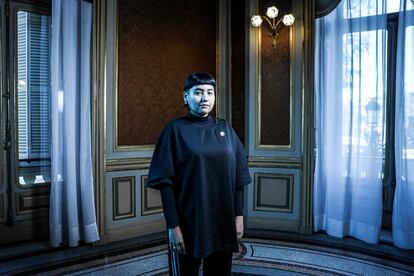Paula Baeza Pailamilla, Mapuche activist: ‘Our spiritual authorities were satanized by Christianity’
The Chilean artist uses her own body in performances to broadcast her people’s resistance. Facing down colonialism, she asks for collective, self-critical reflection

Paula Baeza Pailamilla is not just a Chilean artist known for her exhibitions and performances in several countries in South America and Europe (in 2020, she was a participating artist at the 11th Berlin Biennale in Germany). The Mapuche activist has converted her body into its own museum, based on her conviction that her identity expresses many things that we should know. Since 2016, she has belonged to the Mapuche collective Rangiñtulewfu. She carries aloft the mission of her people, that of the Indigenous communities who have been oppressed and marginalized for centuries. Baeza was recently in Madrid to speak about decolonialization and stage a performance at the Thyssen Museum. The artist, born in 1988 in Santiago de Chile, now lives in Zurich. She met EL PAÍS at Madrid’s Casa de América. She’s happy, the smile unable to be wiped from her face, except when she speaks of the right-wing’s advance on her continent.
Question. How can we decolonialize the collective imagination?
Answer. I use the body as a place of encounter, of trace and memory. I feel that it is evidence of my colonial history. I am Mapuche and have a hybrid identity due to my family’s context, they were displaced from the country to the city at the beginning of the 20th century. There, a structure of identity was built in which Mapuche begins to be thought of in an urban context. And from that identity hybridization of what my own body means, its features and physical heritage, I work on decolonialization. When my body appears, I feel that there is resistance and existence that demonstrates how our bodies are still alive. Our ancestral memory is not just a story of the hegemonic narrative, we also have a voice, we are alive and we can self-represent. Through performance, I use my body to speak of these conflicts.
Q. Is the narrative still hegemonic? It hasn’t advanced at all?
A. In Chile it has, thanks to social movements. But the history of misappropriation by the state has been a narrative told by them, and it has been rendered invisible.
Q. Them?
A. The elite, since the mid-1800s, the beginning of what they call the pacification of the Araucania, as they called the occupation of the last territory of Wallmapu, the Mapuche territory. That is when they established this narrative of what Chile was, without other identities and other peoples. They stopped recognizing other ways of life and built a national, creole, mestizo identity, erasing the others. The invasion of Indigenous territories is hardly mentioned in schools, and if it is, it is to undermine them, that we deserved to be invaded for the good of development and the future. In the last 50 years, this has started to be made visible, the Mapuches have started to rebuild a story of what was broken. Thanks to that resistance and struggle, they have won spaces. They’ve been left with no other option but to accept it.
Q. The body is identity?
A. Yes, but at the same time it is a super-plastic, modifiable identity, one that depends on our context. It’s also very transformable, performative. Identity and body are performative.
Q. Is there space for performance in such a quickly moving world?
A. People have always had individual and group bodily expression. And performance is an ancient, ancestral, ritual practice. There will always be space, it will always be necessary to say things in another way that cannot be said. The Mapuches have the epeu, stories that are told through animals. Performance is a cultural tool to preserve the collective memory.
Q. One of your performances consists of situating yourself in the middle of a river to interact with its stones. In another, of walking around dressed in cardboard boxes in front of Zurich’s luxury stores. At the Thyssen, you camouflage yourself with the color of the wall. What is the concept behind this?
A. I position myself as a Mapuche person with all the complexity of my history, of my family. I am an Indigenous person who is in a museum, in front of luxury stores… My body imparts a lot of information, and, just now in Switzerland, I felt the scrutiny from people who want to decode me, because in addition, I am a migrant. When one does a performance, they are calling on a miracle. But when I cease to perform and they keep staring, I feel how much my body means. Bodies mean things. We are experts in decoding things, for better or worse, and that is the point from which I do my essential work.
Q. You have uncovered horsehair that was used to make sex toys. What did you discover?
A. This work opened my mind in respect to pleasure, to how Mapuche people desire. In an ethnographic book from 1911, Psicología de los araucanos [Psychology of the Araucanian people], there were drawings of objects called güesquel, a prothesis that men put on to give pleasure to women, made with horsehair and woven by women. There is a very strong knowledge of the female body. They say that they were used to make people fall in love, that they embodied something affective, not solely sexual. They had the same desires as we do today.
Q. You define yourself in opposition to the European model of gender binary. Is the gender binary European?
A. Christianity, being super-predominant, imposed different gender roles. Before, the roles were different. I am critical of this colonial heritage.
Q. What did Christianity impose?
A. It took it upon itself to dominate from the spiritual realm. It was quite confrontational. In the Mapuche culture there is no clear difference between the spiritual, the political and the social, they work together. One of the greatest injuries was their division. The spiritual authorities were satanized, and by eliminating them, their system of organization began to crumble. Christianity came to break the social structure, it told us that there is evil knowledge to fear. That’s a wound from which it has cost us to heal and re-discover the most profound side of us. Life is not just a political stance or a job, there are interior things, from other planes, from a territory, the spiritual, to recover.
Q. What work do we have to do as Europeans in respect to decolonialization?
A. The work is to think of oneself. What lies in history, how are we living and dealing with it? History can’t change, but there are reflections that you must continue to make about reparation and self-criticism, something that is done collectively.
Q. Do you feel that Chile has advanced?
A. We had never seen as much state violence as we did during the 2019 protests, it was shocking. At the same time, there was hope. And the new constitution that lost last year was a dream, it took into account Indigenous people, sexual diversity, women… Now we have reached a point of hopelessness: between continuing with Pinochet’s constitution or that of the updated liberal right. Very sad, like Milei’s victory. The right-wing is taking power, things are worse. Chile’s case resonates in other countries in Latin America.
Sign up for our weekly newsletter to get more English-language news coverage from EL PAÍS USA Edition
Tu suscripción se está usando en otro dispositivo
¿Quieres añadir otro usuario a tu suscripción?
Si continúas leyendo en este dispositivo, no se podrá leer en el otro.
FlechaTu suscripción se está usando en otro dispositivo y solo puedes acceder a EL PAÍS desde un dispositivo a la vez.
Si quieres compartir tu cuenta, cambia tu suscripción a la modalidad Premium, así podrás añadir otro usuario. Cada uno accederá con su propia cuenta de email, lo que os permitirá personalizar vuestra experiencia en EL PAÍS.
¿Tienes una suscripción de empresa? Accede aquí para contratar más cuentas.
En el caso de no saber quién está usando tu cuenta, te recomendamos cambiar tu contraseña aquí.
Si decides continuar compartiendo tu cuenta, este mensaje se mostrará en tu dispositivo y en el de la otra persona que está usando tu cuenta de forma indefinida, afectando a tu experiencia de lectura. Puedes consultar aquí los términos y condiciones de la suscripción digital.









































